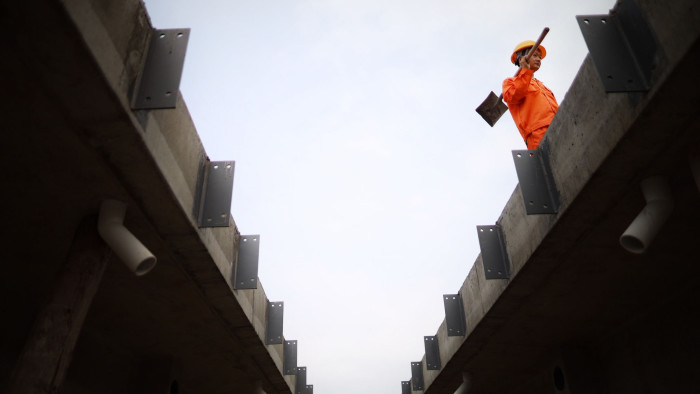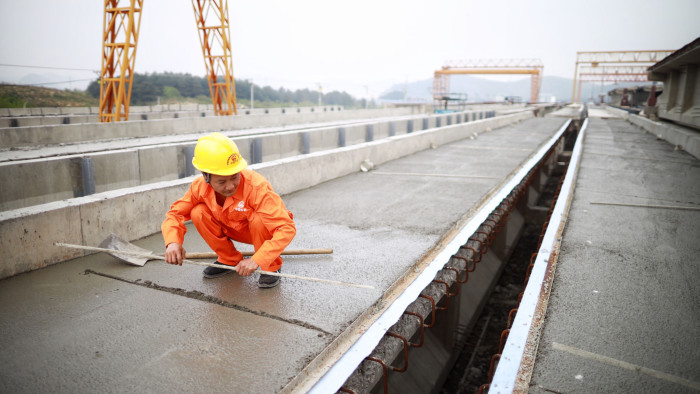Covid-19 and climate change reshape infrastructure plans

Roula Khalaf, Editor of the FT, selects her favourite stories in this weekly newsletter.
As the coronavirus took hold in the Chinese city of Wuhan, officials at the Asian Development Bank received a call from China Gas, a longstanding private sector client of the Manila-based backer.
“We were asked whether the ADB could help China Gas finance liquefied natural gas for new hospitals that were hastily being constructed to meet the growing demand for beds,” says Michael Barrow, head of lending in the private-sector division. “We now have to prioritise Covid-immediate responses.”
The pandemic means this is not the time for “business as usual”. Infrastructure plans are being put on hold, whether by the private sector and governments or development banks such as the ADB and the Beijing-based Asian Infrastructure Investment Bank, which in more normal times make possible many of the most ambitious cross-border projects.
The outbreak has prompted fears that vital work will be postponed indefinitely as money goes to dealing with more immediate threats. The ADB has just tripled to $20bn its spending to help governments deal with the consequences of the virus.
Recent progress in ensuring that infrastructure is green, sustainable and resilient may be suspended as governments back away from commitments to deal with longer-term threats such as climate change and rising sea levels.
The blue skies that have returned to the region — replacing the yellow and grey as industry grinds to a halt and the roads empty of vehicles spewing toxic fumes — may even remove the sense of urgency in dealing with pollution. If oil is at $20 a barrel, the need to switch to renewables may seem less pressing.
Still, regional development banks now have a critical role in helping to steer a course between the immediate threat of Covid-19 and the long-term need for infrastructure to support growth. Often, they have more credibility than governments, especially in the eyes of the private sector.
Individual governments in emerging Asia often need help with both planning and financing the infrastructure projects that — if done right — are the key to prosperity. They include roads so farmers can get produce to markets and children can attend school, or power plants so countries can attract manufacturing industry and jobs. But few governments, whether in developing or developed nations, do a good job with this.

Politicians tend to think in terms of election cycles, which can be as short as two years. Infrastructure, on the other hand, is all about spending money today for a benefit that will become apparent years later.
Meanwhile, when setting returns, the private sector considers governments as among the biggest risk factors, whether for obtaining land or permits. If the government changes, policies often change too, and support fades away leaving private companies stranded.
Weekly newsletter

Your crucial guide to the billions being made and lost in the world of Asia Tech. A curated menu of exclusive news, crisp analysis, smart data and the latest tech buzz from the FT and Nikkei.
One consequence of the pandemic, particularly the threat to employment, is awareness of the potential for a breakdown in social cohesion. The response is likely to involve developments such as focusing on food security for the poor in the short term and ensuring that social safety nets are stronger in the longer term.
“Social transfers are critical,” says Ramesh Subramaniam, head of south-east Asia for the Asian Development Bank, adding that companies have only a small supporting role in such programmes.
Once the immediate threat from the Covid-19 pandemic passes, climate change could force all constituencies to think about infrastructure in new ways — including focusing on green, sustainable and resilient ventures. In other words, infrastructure investment and ESG investing are likely to converge. That already resonates with some parts of the private sector, which is under increasing pressure globally to comply with best standards.
These days, private institutions such as BlackRock and other asset managers, along with banks and insurers, are taking the lead in boycotting formerly standard infrastructure projects, such as building thermal coal plants.
Insurers such as Swiss Re increasingly consider climate change in their calculations because they insure against events such as extreme weather, which has increased in both frequency and severity because of climate change. Swiss Re, like other insurers, says that it sees the need for sustainable, resilient infrastructure as a kind of risk management.
Affordable housing: a new priority
The most sustainable infrastructure projects now are in new initiatives, such as affordable housing, that have both an immediate social and economic effect and can attract the private sector too.
Affordable housing has become a priority for development banks in the region. The International Finance Corporation, the private sector arm of the World Bank, is working with a Swiss company to build such housing in Vietnam — a project called EZ Land — and with Ciputra, a local property developer, on the outskirts of Jakarta, Indonesia.
Vivek Pathak is in charge of East Asia for the IFC arm of the World Bank Group. He says that when he was coaxing private sector companies to build housing for a price that allowed them to make a profit while also adopting the best green standards, he found the most persuasive argument was to ask which sort of housing was likely to hold its value — green or brown.
“It has to make business sense. It can’t just be about corporate social responsibility,” he says.

Comments